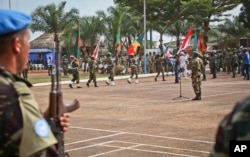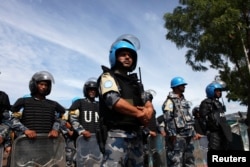Allegations of sexual abuse by United Nations peacekeepers and staff rose in 2015, despite the institution's "zero tolerance" policy on such misconduct.
According to a new report from Secretary-General Ban Ki-moon, released Friday, there were 99 such allegations last year, compared to 80 in 2014.
The majority — 69 — were made against troops and police in 10 U.N. peacekeeping operations, nine of which are current and one is closed. There were 30 cases of sexual exploitation and abuse — or SEA in U.N. jargon — against staff members.
"That anyone serving under the U.N. flag should prey on the vulnerable is truly an abomination," said Atul Khare, under-secretary-general for field support, at a news conference Friday. "We will never, never agree to protectors turning into predators."
He said the U.N. would work to make sure that prevention measures are robust, and that where incidents occur, victims receive support and allegations are vigorously investigated so justice can be served.
The U.N. has instituted remedies for victims, including financial compensation and mechanisms to assist and encourage victims in reporting allegations.
Spotlight on peacekeepers
The U.N. has more than 100,000 troops and police from 122 countries, working in 16 operations — most in very difficult and dangerous environments.
More than half the peacekeeper-related abuse allegations were made against just two U.N. missions — MINUSCA in the Central African Republic with 22 allegations, and MONUSCO in the Democratic Republic of Congo with 16 allegations.
"The particularly high number of claims of abuse in C.A.R. is striking," Richard Gowan, U.N. expert at the European Council on Foreign Relations, told VOA. "The U.N. mission there clearly has even worse standards of discipline than U.N. operations as a whole, and cleaning it up has to be a priority.”
Missions in Haiti, Liberia, Ivory Coast and Mali accounted for nearly 40 percent of the allegations. Peacekeepers in Sudan's Darfur region, Abyei — on the border of Sudan and South Sudan — and Cyprus were the subject of four allegations.
A third of all the allegations involved the abuse or exploitation of children. Fifteen paternity cases have been filed in the 69 cases.
Gowan noted that one of the root problems in containing the SEA issue should be focusing more attention on the countries that are sending "ill-prepared and ill-disciplined troops to serve on U.N. missions."
Strengthening U.N. response
Secretary-General Ban already has taken a series of steps to try to stem peacekeeper abuse. These include firing the head of MINUSCA last year, and holding a video conference with the heads of all peacekeeping missions and their force commanders to reinforce his "zero tolerance" position.
Last month, he appointed Jane Holl Lute, a former U.S. official with extensive experience in U.N. peacekeeping, to coordinate the U.N.'s response to SEA.
The report released Friday details more significant steps, including asking troop-contributing countries to agree to on-site court martial proceedings when allegations amount to sex crimes under their national laws.
The secretary-general also is urging countries to provide DNA samples from their accused peacekeepers to assist investigations.
Additionally, there is renewed focus on vetting troops for prior abuse allegations, and where such allegations are widespread or systemic, entire contingents could be repatriated.
Their replacements would come from different troop-contributing countries, so repeat offenders could effectively be drummed out of the lucrative U.N. peacekeeping business.
Transparency and accountability
The U.N. has no authority to prosecute peacekeepers for crimes. It can only repatriate them and hope their home country will follow through with prosecution. In several past cases, some troop-providing countries have not investigated or even responded to the U.N. regarding allegations.
An official with the U.S. mission to the United Nations said Friday that its delegation is working on a Security Council resolution that would push for greater transparency and accountability by countries.
"The point of the resolution is to send a strong signal that the Security Council will not tolerate sexual exploitation and abuse in U.N. peacekeeping," the American diplomat said.
The diplomat said the draft proposes the council endorse several of the secretary-general's decisions, including to repatriate military and police units when there is evidence of a pattern of SEA, or when countries have not taken steps to investigate SEA allegations or to inform the secretary-general of progress in an investigation.
The United States, while not a significant contributor of troops to the U.N., does provide more than a quarter of the Department of Peacekeeping Operations' annual $8 billion budget.







